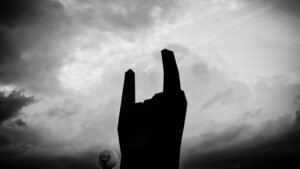Jay-Z’s Extortion Claim Against Tony Buzbee Now Poised to Survive
After a judge said last month that he was close to dismissing Jay-Z’s extortion allegation against Texas attorney Tony Buzbee, the same judge signaled Wednesday he had changed his mind and was inclined to let the Roc Nation founder proceed with the legal claim.
At a hearing in Santa Monica, California, the Los Angeles County judge said he reconsidered his position based on stunning new evidence collected by private investigators and submitted by Jay-Z’s lawyers.
The new evidence revolves around a conversation the investigators had with the Jane Doe who claimed in a revised lawsuit filed last December that Jay-Z raped her alongside Sean “Diddy” Combs at an awards show afterparty when she was 13 years old. In the conversation recorded on Feb. 21 on the Jane Doe’s front porch in Alabama, the woman allegedly said, “It was more Diddy, but Buzbee brought Jay-Z, into it.” She appeared to tell the investigators that it was Buzbee who “pushed” her into publicly naming Jay-Z as one of her assailants.
“If the evidence can be considered – and the court believes it can be considered for this motion – it supports not only the defamation cause of action but also the extortion cause of action,” Judge Mark Epstein wrote in his tentative ruling issued Wednesday. “For if one accepts Doe’s statements to the investigators at face value, then she at least inferentially did not authorize the settlement letter to be sent or even conclude that she was going to sue Carter at the time the [letter was] mailed. Without a present intent to bring a lawsuit, the litigation privilege will fail.”
Rolling Stone previously obtained a portion of the alleged doorstep discussion with the Jane Doe. In the snippet, one of the investigators specifically asked if Doe was saying that Jay-Z, born Shawn Carter, was at the afterparty but “didn’t have anything to do with the any sexual acts towards you.”
“Yeah,” Doe replied. The other investigator then asked if it was Buzbee who suggested Jay-Z had a role in the alleged attack following the MTV Video Music Awards in 2000. “He was the one that kind of pushed me towards going forward with him, with Jay-Z,” the woman replied.
Buzbee’s lawyers fought the admissibility and relevance of the conversation at the hearing Wednesday, arguing the Jane Doe felt threatened and intimidated by the visit from the investigators, that the interview invaded her right to attorney-client privilege, that she didn’t consent to any recording, and that Carter’s camp was “cherry-picking” certain statements out of context. The judge said Alabama allows conversations to be secretly recorded, even though California, where the extortion and defamation lawsuit was filed, does not.
“I don’t love surreptitious recordings, but we don’t export our laws to other jurisdictions,” Judge Epstein said during the hearing. He then asked Carter’s lawyers point-blank who hired the investigators. Carter’s attorney Robert Schwartz said he wasn’t exactly sure but after checking with his client, he confirmed someone working for Carter hired the pair without telling Carter. The judge said he was skeptical Carter didn’t know but it was possible the staffer worked independently to give Carter “plausible deniability.” Either way, he said it wasn’t a violation for Carter to approach the Jane Doe, though it would have been if his lawyers did so while knowing she was represented by Buzbee.
In his new tentative order, Judge Epstein maintained his prior stance that much of Carter’s defamation claim against Buzbee showed enough merit to clear the first hurdle set up by Buzbee’s motion to strike. He then turned to the demand letter Buzbee sent to Carter last November seeking private mediation and a financial settlement ahead of an anticipated lawsuit. Carter says the letter amounted to extortion. Buzbee’s lawyers argue it was protected under the litigation privilege, meaning it was allowed as part of a good-faith effort to resolve a civil dispute.
Judge Epstein reasoned that if Doe’s statements, as supplied by Carter’s camp, are accurate, they raise a triable issue of fact, meaning a jury might find that she did not authorize the letter sent weeks before Doe met and spoke with Buzbee for the first time. “And without a client’s authority to send the demand letter, the court is far from confident that the [letter did] not start to look more like extortion than an attempt to settle a civil suit,” the judge wrote in his tentative.
In his oral argument, Buzbee’s lawyer Samuel Moniz said he disagreed with the court’s analysis. “The litigation privilege is extremely broad, extremely powerful, and pretty much the only claim that it doesn’t eliminate is one for malicious prosecution,” Moniz, from the firm Sheppard Mullin, said. “There’s direct evidence from multiple people who say [Jane Doe] authorized this. There’s direct evidence she was referred to this firm to pursue claims against Carter.”
Judge Epstein told Muniz, “I take your point on this and will give it some additional thought.” The judge declined to adopt his tentative at the end of the hour-long arguments and instead set a follow-up hearing for further argument on April 7.
“The court wants to emphasize that this is a difficult motion, and that the new evidence has thrown a monkey wrench into the court’s reasoning,” Judge Epstein wrote in his tentative. “And further, it could well be that Buzbee prevails at trial, or even potentially on summary judgment, as new evidence comes to light and discovery gets underway.”
When Jay-Z first sued Buzbee anonymously in November, he claimed the high-powered Houston attorney was “shamelessly“ trying to extort him while representing dozens of plaintiffs with claims against indicted music mogul Sean Combs. Three weeks later, Buzbee filed the amended complaint naming Carter as the male celebrity who allegedly raped Doe alongside Combs when she was a minor.
Carter immediately — and vehemently — denied Doe’s allegations and confirmed he was the John Doe who filed the extortion lawsuit. The Jane Doe went on to voluntarily dismiss her entire complaint against Carter and Combs with prejudice — meaning it can’t be filed again — on Feb. 14 after admitting there were inconsistencies in her story.
Since then, Carter has filed a separate defamation lawsuit against Doe in Alabama, claiming she and Buzbee engaged in an “evil conspiracy” to extort him with the “completely fabricated” and “wildly horrific” rape claim.
In a sworn statement, Carter said that he considered Buzbee’s demand letter an “existential threat.” “I felt that Mr. Buzbee was placing a gun to my head that I either bow to his demands or endure personal and financial ruin. His actions caused me mental anguish about the ticking time bomb and what it would do to me, my family, and my hard-earned reputation,” he wrote.
Combs, meanwhile, is currently charged with sex trafficking, racketeering conspiracy, and transportation to engage in prostitution. If convicted, he faces 15 years to life in prison. His criminal trial is set to begin May 5 in New York.
Combs has been sued by dozens of plaintiffs alleging sexual misconduct. The music mogul, 55, denies any wrongdoing. “No matter how many lawsuits are filed, it won’t change the fact that Mr. Combs has never sexually assaulted or sex-trafficked anyone — man or woman, adult or minor,” his lawyers previously told Rolling Stone.
You may be interested

Asian stocks tumble as U.S. tariffs fuel slowdown fears
new admin - Mar 31, 2025[ad_1] Asian share markets tumbled on Monday, driven by concerns that the broad and steep U.S. tariffs to be announced…

Olympian shares top three exercise tips to beat pain
new admin - Mar 31, 2025An Olympic athlete has shared her top tips to beat three types of pain, after a survey found almost a…

Missing U.S. soldiers’ vehicle recovered from Lithuania swamp but there’s no word on them
new admin - Mar 31, 2025Vilnius, Lithuania — A U.S. armored vehicle that went missing in Lithuania has been retrieved from a swamp after a…
































